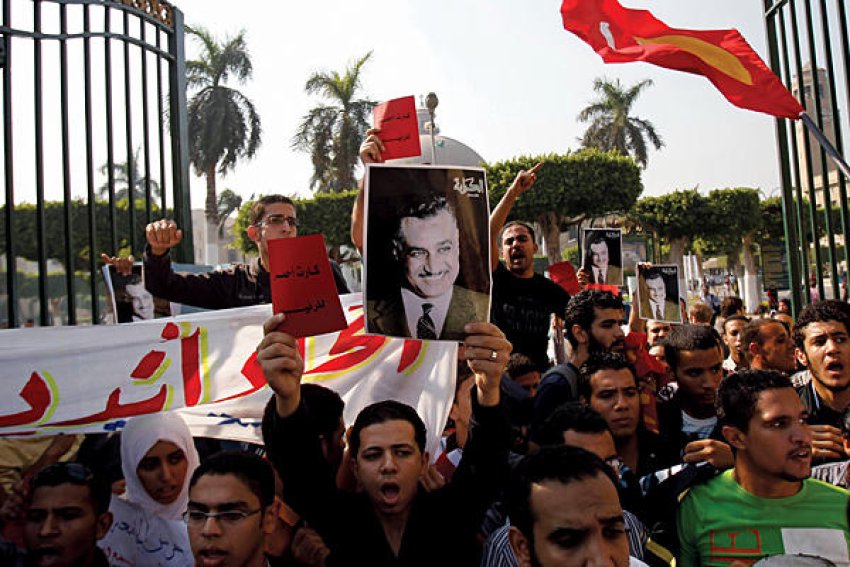
Having started with a fearless uprising for democracy and economic justice that is sweeping the Arab world, 2011 is shaping up to be a decisive year for the Middle East.
By January 14, the first dictator had already been overthrown: Zine El Abidine Ben Ali of Tunisia.
Protests inspired by the Tunisian revolution have occurred in several Arab countries, repeatedly in Yemen and Jordan. On January 28, the Middle East’s most populous country, Egypt, was rocked by riots after police tried brutally, but unsuccessfully, to end four days of protest against the 30-year-old dictatorship of Hosni Mubarak.
Standing against this democratic tide is the apartheid state of Israel and its backers, the Western powers (or “the international community”, as they call themselves).
If their statements about the unsuccessful 2009 democratic uprising in Iran were the yardstick, “the international community” would be supporting the Arab uprisings.
The protests have been led by educated young people frustrated by poverty and lack of political freedom, with enough access to the internet to be more politically sophisticated than previous generations who grew up under totalitarian regimes.
The spectre of “Islamic extremism”, the West’s standard justification for supporting tyrants in the Middle East, is absent from the current movements. Slogans and demands have not touched on religion.
In Tunisia, an Islamic party, Hizb an-Nahda, is one of several previously banned parties in a political alliance that is a part of, but by no means dominant over, the democratic movement.
However, Ali Larayedh, a leader of Hizb an-Nahda, told the January 21 New York Times that the party does not support the state enforcing religious practice. It supports women’s rights and opposes laws banning alcohol or regulating dress, Larayedh said.
Other parties in the alliance are secular, including the Tunisian Workers’ Communist Party (PCOT).
The Muslim Brotherhood in Egypt, which is historically the main opposition party, is largely absent from the huge protest movement.
The West routinely ignores its own much-trumpeted democratic values for economic or political advantage.
Ben Ali and Mubarak both faithfully based their economic policies on diktats from the International Monetary Fund and World Bank that impoverished the people for the benefit of Western corporations.
Both were subordinate strategic partners of the US. Mubarak’s torture chambers even became a favoured destination for the CIA’s “extraordinary rendition” program.
Until Ben Ali’s overthrow, the US was silent on Tunisia. But since his departure, the US has hailed Tunisian democracy while making it clear that it supports an orderly transition to elections under the current interim government and opposes the demands of protesters for an immediate handover to a new government accountable to the people.
In the case of Egypt, the US has come out in defence of the Mubarak regime, the second largest recipient of US military aid (after Israel).
Secretary of State Hillary Clinton said on January 25: “Our assessment is that the Egyptian government is stable and is looking for ways to respond to the legitimate needs and interests of the Egyptian people,” Al-Jazeera reported.
US support for Mubarak goes beyond what is routine for compliant Third World tyrants.
As the regime’s police used tear gas and bullets on pro-democracy protesters, US vice-president Joe Biden explained in a January 27 interview with PBS: “Mubarak has been an ally of ours in a number of things and he's been very responsible on … Middle East peace efforts, the actions Egypt has taken relative to normalising the relationship with Israel …
“I would not refer to him as a dictator.”
Without a collaborating regime in Egypt, Israel would not be able to maintain its siege of the Gaza Strip. The border between the Gaza Strip and Egypt is closed, combining with Israel’s closure of its border to impose a total blockade.
The mass protests in Egypt risk more than the interests of Mubarak and his cronies — the fall of Mubarak could well liberate the long-suffering Gazan people from Israel’s inhumane siege.
On January 28, Time interviewed a “minister in the government of [Israeli] Prime Minister Benjamin Netanyahu … who spoke on condition of not being identified by name or portfolio”.
The Israeli minister said Israel had confidence that Mubarak could crush the democracy protests.
Nonetheless, he was clearly unsettled by the democratic surge and expressed Israel’s fear of democracy as a threat to its interests: “I’m not sure the time is right for the Arab region to go through the democratic process,” he said.
The minister argued Arabs weren’t yet ready to be trusted with a vote. “It might take a generation or so.”
Video: Spoof on US State Departments Position on Egypt. Media4Movement.
Comments
Anonymous replied on Permalink